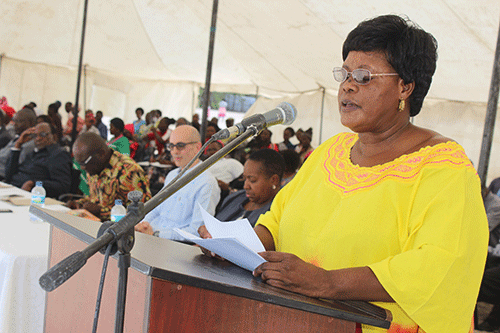EENHANA – Despite efforts from government, development partners, churches and civil society to curb gender-based violence, the scourge continues unabated.
Minister of gender Doreen Sioka said this in a speech delivered by deputy minister of marginalised communities Royal /Ui/o/oo at the 23rd annual meeting of the Council of Traditional Leaders in Eenhana, Ohangwena region, this week.
“Horrendous incidents of GBV have been reported in local newspapers. We are losing the lives of our young Namibians, especially the youth; and as a result, some children become orphans,” she said.
According to the statistics from the police, about 5 427 GBV-related cases were recorded in the 2019/20 financial year, compared to about 2 643 recorded in 2020/21.
Sioka said although there is a significant decrease in cases of GBV, the number is still worrisome.
“Some of the contributing factors to GBV cases include alcohol and substance abuse. The number of rape cases due to alcohol abuse has increased from 51 in 2019/2020 financial year,” she noted.
To address these cases, she said the government and stakeholders developed “a call to action”, a prioritised National Plan of Action on GBV 2019–2023.
“The plan of action has four action areas: Survivors first, safety nets and community care, youth in the lead and counting the cost. Strategies to address these focused areas are being implemented by stakeholders, including government institutions, civil society, NGOs, etc,” she said.
For effective implementation of national GBV programmes and activities, Sioka said the national coordination mechanism for the implementation of the national gender policy has been adopted.
She said her ministry is also in the process of developing a strategy to engage traditional authorities on GBV.
“In Namibian society, the sphere of influence of traditional leaders continues to be strong. As heads of the communities, traditional leaders are key decision makers and the custodians of tradition, culture, and rites,” she further stated.
Sioka said there is a strong need to continue initiating strategic interventions to address GBV, trafficking in persons, and violence against children through the regional GBV clusters that were established in all regions.
According to the World Health Organisation (WHO), despite the robust policy and legal framework in Namibia, women and girls are still exposed to violence throughout their lifecycles, whether at home, school, or in the communities, they live in.
The WHO said, in Namibia, one in three women experience physical and/or sexual violence; the majority perpetrated by intimate partners.
“Six percent of Namibian women reported experiencing violence during pregnancy and 15% who experienced violence never sought help or told anyone about the violence,” reads a brief from WHO.
Sioka mentioned that some harmful traditions and cultures fuel GBV.
“Thus, traditional authorities being the custodian of traditions and cultures are key to address the harmful traditions and cultures in relation to GBV and violence against women and children,” she said, adding that there is a need to act accordingly to ensure that the children grew in communities that are free of violence by enforcing positive customary laws.
With regards to trafficking in persons, Sioka announced that Namibia maintained tier one status for the past three consecutive years.
“As a country, we met the required minimum standard to address trafficking in persons. These range from having laws in place such as Combating of Trafficking in Person Act of 2018: awareness creation campaigns, capacity building of key service providers and providing victim assistance,” said Sioka.
She, therefore, encouraged traditional leaders to continue providing leadership to help GBV victims, potential victims of trafficking and curb violence against children.
– ashikololo@nepc.com.na


